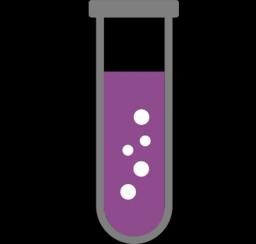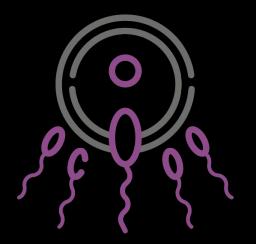
What is In Vitro Fertilisation (IVF)?
IVF, or In Vitro Fertilisation, is a fertility treatment that helps couples have a baby when natural pregnancy is difficult. In this process, doctors take an egg from the woman and sperm from the man and carefully join them together in a lab. When the egg and sperm meet, they form an embryo (a tiny baby at its earliest stage). The embryo is then placed into the woman’s womb, where it can grow naturally into a pregnancy.
In some cases, doctors also call the baby developed by this procedure a Test Tube Baby.
Why Do Couples Need IVF Treatment?
Did you know? According to the World Health Organisation (WHO), about 1 in 6 couples worldwide face infertility, and IVF helps millions of them every year to become parents.
IVF is important because it gives hope to couples who cannot get pregnant naturally. Many things can cause infertility, like blocked fallopian tubes, low sperm count, or age. For some couples, IVF is the best and sometimes the only way to have a baby.
Who Should Consider IVF?
IVF is usually for couples who have tried to have a baby for a long time but haven’t been successful. It can help when:
- A woman’s fallopian tubes are blocked or damaged.
- A man has a low sperm count or weak sperm.
- A couple has been trying for more than a year without success.
- A woman is older, and her chances of a natural pregnancy are lower.
- Couples need to use donor eggs, sperm, or embryos.
- Women might face endometriosis, complications with the uterus, ovarian problems, etc.
In short, IVF is an option for people who cannot get pregnant naturally, even after trying other treatments. Hence, if you are facing such problems, you must immediately consult the best IVF centre in India.
IVF Procedure : Step-by-step
The IVF treatment process is a series of steps that doctors use to help couples become parents. At Crysta IVF, the procedure is done step by step with care, advanced technology, and constant doctor support. Here’s how it usually works:
Step 1 :
Ovarian Stimulation

IVF treatment may be cumbersome physically and emotionally for the couple. Counselling with Crysta Counselors help couples understand their treatment regime and voice their concerns which is important prior to the start of the procedure.
Step 2 :
Monitoring & Egg Collection

During this time, doctors do ultrasound scans and blood tests to track how the eggs are growing. When the eggs are ready, they are gently collected from the ovaries using a small needle. This procedure is quick and done under light anaesthesia, so there’s no pain. The collected ovum is then sent to the embryologist for processing in the ART laboratory.
Step 3 :
Sperm Collection

The man provides a sperm sample on the same day. If the sperm count is low, advanced methods like ICSI may be used. In such a case, the sperm may be extracted from the testes or epididymis by a surgical procedure. Donor sperm can also be an option if needed.
Step 4 :
Fertilisation in the Lab

The collected eggs and sperm are put together in a special lab dish(petri dish) and fused. If they join successfully, they form embryos (early-stage babies). Doctors then observe the embryos for a few days to check their growth and quality.
Step 5 :
Embryo Transfer

Based on the quality of the embryo, one or two healthy embryos are carefully placed into the woman’s womb using a thin tube. This is done on the day 3 or day 5 stage of the embryo, as per the patient. This is a painless process and feels similar to a routine medical test.
Step 6 :
Pregnancy Test

About two weeks later, a blood test is done to confirm if the embryo has successfully implanted and pregnancy has begun. If the test is positive, the patient is thought to be four weeks pregnant
How Successful is IVF and What Factors Affect It?
IVF gives many couples a chance to have a baby, but the success rate is not the same for everyone. It depends on many factors like age, embryo health, lifestyle, and the quality of the fertility clinic. Here’s how different factors affect IVF:
- Age : Younger women usually have higher chances. Women under 35 have a success rate of 50-60% per cycle, whereas the success rate of women after 40 drops to 10–15%.
- Embryo Quality : Healthy, strong embryos have a better chance of attaching to the womb and growing into a baby.
- Lifestyle & Health : Factors like a healthy diet, normal BMI (weight balance), habit of smoking and alcohol and stress, play a role in IVF success.
- Previous Medical Conditions : Certain medical problems, such as PCOS, endometriosis, fibroids, etc, directly impact the success.
- Lab & Doctor’s Expertise : A well-equipped IVF lab, such as Crysta IVF and experienced fertility specialists can make a big difference as we use modern techniques and personalised solutions for each patient.
Expert Advice: IVF works best when the woman is younger, the embryos are healthy, the clinic uses advanced technology, and the couple maintains a good lifestyle.
How Much Does IVF Treatment Cost in India?
Many couples worry about how much IVF treatment will cost. The good news is that in India, IVF is much more affordable compared to many other countries.
Average Cost: On average, the IVF cost in India ranges between ₹1.2 lakh to ₹3 lakh per cycle.
This IVF treatment cost may include a doctor’s consultation, ultrasound scans and regular monitoring, egg collection and the lab fertilisation process.
However, the cost of IVF can change because it depends on certain factors such as:
- Age of the woman : Older women may need higher doses of medicines or multiple cycles.
- Fertility health : Issues like low egg reserve or poor sperm quality may need advanced techniques.
- Type of IVF : IVF, IUI and ICSI have different costs
- Medicines used : Hormone injections and supplements can add up.
- Extra procedures : Embryo freezing, donor programs, or PGT testing can increase cost.
- Clinic & lab quality : Advanced labs with higher success rates may charge more.
- Location of the lab : The labs located in Tier 1 cities cost more than Tier 2 cities.
At Crysta IVF, we don’t want cost to stop your dream of becoming parents. That’s why we offer:
- 0% EMI plans – pay in small monthly instalments
- Flexible financing for treatments and medicines
- Guidance on insurance coverage
Why Choose Crysta IVF for Your Fertility Journey?

20+ Years Experienced Doctors
Crysta’s team includes some of the best infertility specialists in Delhi with 20+ years of experience in handling simple to complex infertility cases.

High Success Rate
Crysta IVF brought smiles to 20,000+ couples’ faces, creating a high success rate for couples facing the infertility problem.

Personalised Care
Every patient’s journey is unique and as a leading fertility centre in Delhi, we provide you with personalised treatment based on your age, health and medical history.

Advanced ART Labs
The success of IVF depends heavily on lab quality. Our IVF hospital in Delhi has advanced technology and modern embryology labs, which help maintain embryo quality and support better outcomes.

Transparent Treatment Pricing
At Crysta IVF, we believe in transparent pricing with no hidden surprises. Many couples choose us because we balance world-class fertility care with affordable treatment and an EMI option.

Trustworthy and Safe
There are no long-term risks or complications that happen during the IVF process. Crysta IVF follows a safe treatment procedure and keeps your identity secure.





What are the Benefits vs Risks of Undergoing IVF Treatment?
IVF has helped millions of couples become parents. But like any medical treatment, it comes with both benefits and risks. Understanding both sides can help you make the right decision with your doctor.
Benefits of IVF
- Chance of Pregnancy: IVF makes it possible for couples who couldn’t conceive naturally.
- Advanced Options: Treatments like ICSI and IUI can help in special cases.
- Hope for Genetic Issues: Tests like PGT help avoid passing certain genetic diseases.
- Control Over Family Planning: Eggs or embryos can be frozen and used later.
- Improved Success Over Time: Modern labs and doctors have improved IVF success rates.
Risks of IVF
- Multiple Pregnancy: Sometimes more than one baby (twins/triplets) can develop, which may bring extra health risks.
- Side Effects of Medicines: Some women may feel bloating, mood changes, or mild pain from fertility injections.
- Procedure Risks: Egg retrieval is a safe but minor procedure; rarely, it may cause bleeding or infection.
- Emotional Stress: IVF can feel mentally and emotionally draining if results don’t come quickly.
How to Prepare for IVF Treatment?
Getting ready for IVF is like getting ready for an important journey. Your body and mind both need care so that the treatment works in the best way possible.
Here are some simple steps to prepare:
- Eat healthy food: Fresh fruits, veggies, whole grains, and enough protein keep your body strong.
- Maintain a healthy weight: Being too underweight or overweight can affect success.
- Quit smoking and alcohol: These can lower the chances of IVF working.
- Manage stress: Relaxation, meditation, or light yoga can help you stay calm.
- Take prescribed vitamins: Folic acid and other supplements recommended by your doctor prepare your body.
- Sleep well: Good rest helps your hormones stay balanced.
- Follow the doctor’s advice closely: Regular check-ups, blood tests, and scans are important before IVF.
Different Services Offered at Crysta IVF
Different Services Offered at Crysta IVF
Myths around IVF
A. Who carries the baby in IVF?
Fact: The mother usually carries the baby after the embryo is placed in her womb. In some cases (like health issues), a surrogate can carry the baby.
B. Will an IVF baby look like the parents?
Fact: Yes. If the egg and sperm are from the couple, the baby will have the parents’ genes, just like in a natural pregnancy.
C. How are IVF babies born?
Fact: IVF babies are delivered just like any other natural pregnancy.
D. What are the disadvantages of IVF?
Fact: IVF can be expensive, physically and emotionally stressful, and may take more than one attempt to succeed. There’s also a slightly higher chance of twins or triplets.
E. Where should I go for IVF treatment?
Fact: Choose a trusted IVF centre such as Crysta IVF with experienced doctors, good success rates, and modern labs. It’s best to check reviews and visit in person before deciding.
F. How do I know if I need IVF treatment?
Fact: If you’ve been trying to conceive for over a year (or 6 months if you’re above 35) without success, or if you have known fertility issues like blocked tubes, low sperm count, or PCOS, then IVF might be recommended.







